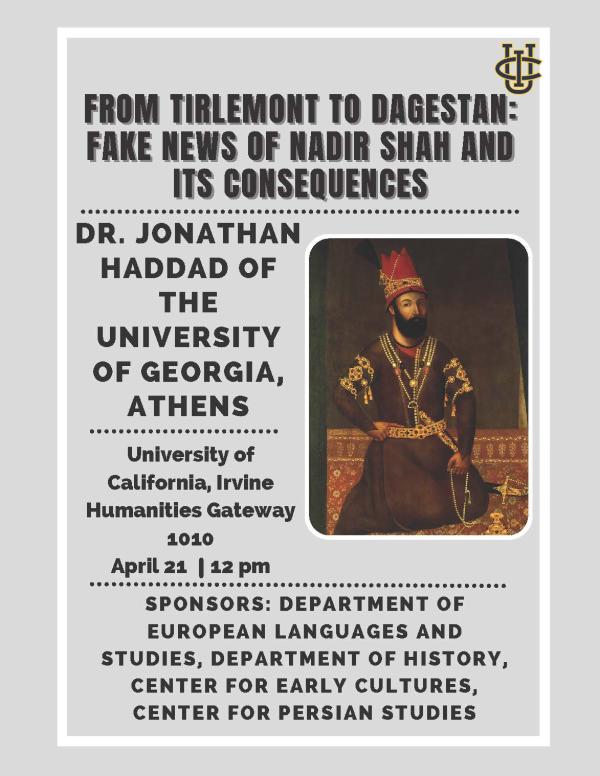Join the Department of European Languages and Studies, in collaboration with the Department of History, the Center for Early Cultures, and the Center for Persian Studies for a talk by Jonathan Haddad, Assistant Professor of French at the University of Georgia, Athens.
Prof. Haddad will present
"From Tirlemont to Dagestan
Fake news of Nadir Shah and its consequences"

From 1726 and 1736 Nadir Quli Afshar, the son of a Turcoman herdsman, entered the service of the Safavid shah Tahmasp II, helped him beat back the Afghans, reclaimed territories lost to the Ottomans, and finally deposed Tahmasp and ascended to the Persian throne, founding the Afsharid dynasty. Accounts of Nadir’s spectacular rise echoed in the halls of the Palais de France in Istanbul, from where embassy dispatches made their way into the Gazette and the Mercure de France and gained a broader readership. There followed several “ripped from the headlines” books published in the decades following Nadir’s conquests spanning genres from sober histories to fictionalized memoirs, even after his assassination in 1747. Between 1740 and 1770, there were four novelizations of Nadir’s life and five purported histories. During this time, rumors flew claiming diverse origins of this “new king of Persia.” Some claimed that he was from a small Belgian burg, others a French defrocked Benedictine monk. A 1736 letter from the French embassy in Istanbul, reprinted in the Mercure, however, correctly identified Nadir as a native of the Khorasan province of Persia. Drawing from consular archives, missionary accounts, and the periodical press, this talk will first examine how multiple reports of Nadir Shah’s conquest circulated from Persia, often through Istanbul, to finally end up in the French press. The circulation of “fake news” about Nadir Shah will then allow us to trace the paths of foreign dispatches through the press and into the history books, where “pseudofactual” accounts and legends become fossilized. Finally, as we follow these accounts as they cross borders, I’d like to discuss the Europeanized version of Nadir Shah in the context of the contemporaneous portrayal of renegades and the role of fake news in delineating cultural boundaries.

Jonathan Haddad is Assistant Professor of French at the University of Georgia, where he specializes in eighteenth-century studies and France’s relationship with the Islamicate world. He received his Ph.D. in French from the University of California, Berkeley. His current book project, The Snake in the Library: Turkish Literature in the French Republic of Letters, brings to light previously unexamined debates about the existence and value of “Turkish literature” within eighteenth-century France, arguing that expansive beliefs about literature among French scholars and travelers to the Ottoman Empire conflicted with a French literary market oriented towards the consumption of a narrowly defined “Turkish style.”
